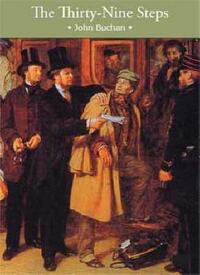You need to sign in or sign up before continuing.
Take a photo of a barcode or cover
adventurous
challenging
dark
funny
mysterious
fast-paced
Plot or Character Driven:
A mix
Strong character development:
No
Loveable characters:
Yes
Diverse cast of characters:
No
Flaws of characters a main focus:
No
adventurous
mysterious
fast-paced
Plot or Character Driven:
Plot
Strong character development:
No
Loveable characters:
No
Diverse cast of characters:
No
Flaws of characters a main focus:
No
adventurous
As brilliant as ever! I first read this book as an 11 year old boy sitting on my Grandparents lawn one sunny day, I reread it today aged 41 sitting on my own lawn on a sunny day.
Dashing adventure with wit galore! A full on romp! I honestly love this book.
Dashing adventure with wit galore! A full on romp! I honestly love this book.
One of those gems that I revisit once a year. The quintessential 'Boy's Own' adventure.
The Thirty-Nine Steps is a spy thriller novella that concerns itself with protagonist Richard Hannay as he is pulled into a dire situation, coming to gain the knowledge of a political assassination involving a Greek official. He puts on a game of cat-and-mouse with the British police for a murder he did not commit, as well as a mysterious organization that seeks to invoke a grand scheme that has the potential to change European history.
One interesting part of this novella is that it pioneered the spy thriller genre, which may be what makes-or-breaks it. If you have read plenty of other novels of the type, The Thirty-Nine Steps may prove to be excruciatingly simple in comparison and a slog to get through as a result. One reason as to why is the characters. If you wish to experience the thrill of emotional and deeply-characterized personas through tense situations, you will inevitably be disappointed. Every character here serves the plot and does not go through any significant development including the protagonist. Richard Hannay exploits are nothing to be attached to, as there is no emotional investment that is directed towards his goals and endangered position.
To me, this slight criticism comes from my point of view that emotional storytelling is key in telling a character-driven narrative. However, I almost feel as if it did not matter in comparison to the entertainment value of the novella. The narrative of The Thirty-Nine Steps is straightforward and simplistic, and the mystery unfolds at a comfortable pace. Each step of the journey is filled with quirky character interactions that do not overstay their welcome, being paced quickly without losing footing. The novella did not feel as if a stupendous amount was omitted to fit a certain word count or too barebones either for that matter. Action drives the brisk plot as well, meaning that at no point did I feel bored as I experienced Hannay's plight through England and Scotland.
The Thirty-Nine Steps was an enjoyable read, but I am aware that it is not for everyone. If one seeks a short weekend/evening read to power through, this novella is perfect if one also does not expect perfection. There is nothing to give any lasting impressions after a read, but it is nothing to regret either.
I should finally add that there are many adaptations of this story, including an Alfred Hitchcock adaptation. There are also four sequels that seem to be full-length novels, of which I have not read at this point. I have heard the Hitchcock film is phenomenal, but that should not come across as a surprise.
One interesting part of this novella is that it pioneered the spy thriller genre, which may be what makes-or-breaks it. If you have read plenty of other novels of the type, The Thirty-Nine Steps may prove to be excruciatingly simple in comparison and a slog to get through as a result. One reason as to why is the characters. If you wish to experience the thrill of emotional and deeply-characterized personas through tense situations, you will inevitably be disappointed. Every character here serves the plot and does not go through any significant development including the protagonist. Richard Hannay exploits are nothing to be attached to, as there is no emotional investment that is directed towards his goals and endangered position.
To me, this slight criticism comes from my point of view that emotional storytelling is key in telling a character-driven narrative. However, I almost feel as if it did not matter in comparison to the entertainment value of the novella. The narrative of The Thirty-Nine Steps is straightforward and simplistic, and the mystery unfolds at a comfortable pace. Each step of the journey is filled with quirky character interactions that do not overstay their welcome, being paced quickly without losing footing. The novella did not feel as if a stupendous amount was omitted to fit a certain word count or too barebones either for that matter. Action drives the brisk plot as well, meaning that at no point did I feel bored as I experienced Hannay's plight through England and Scotland.
The Thirty-Nine Steps was an enjoyable read, but I am aware that it is not for everyone. If one seeks a short weekend/evening read to power through, this novella is perfect if one also does not expect perfection. There is nothing to give any lasting impressions after a read, but it is nothing to regret either.
I should finally add that there are many adaptations of this story, including an Alfred Hitchcock adaptation. There are also four sequels that seem to be full-length novels, of which I have not read at this point. I have heard the Hitchcock film is phenomenal, but that should not come across as a surprise.
The Thirty-Nine Steps is a WWI-era thriller by John Buchan; in the introduction, he mentions in a letter to a friend that he wrote it because he was bedridden with illness and had exhausted his own supply of easy, amusing thriller novels, so he decided to write his own. The novel follows protagonist Richard Hannay, a Scottish-born Rhodesian miner who has recently returned to the mother country and finds himself embroiled in a plot to throw Europe into war. With the man who warned Hannay of the plot soon murdered in his own flat, Hannay finds himself on the run in Scotland, pursued by both the conspirators and the British police.
I think I picked up The Thirty-Nine Steps because it was on the BBC’s Big Read, and because I recently got an ereader and was looking for public domain novels to download to test it out. It’s a relatively entertaining lark which reminded me quite a bit of Geoffrey Hosuehold’s Rogue Male (though I liked it better, since it has more variety in it) and no doubt enthralled many a soldier in the trenches of France. It moves along at a decent pace and clocks in nice and short at just over 100 pages. I’m just not sure why it’s so famous or why it made the Big Read list – there are probably hundreds of thrillers from the era that are of about the same quality. The Thirty-Nine Steps is entertaining enough, but if you die without reading it your life wasn’t necessarily a waste.
I think I picked up The Thirty-Nine Steps because it was on the BBC’s Big Read, and because I recently got an ereader and was looking for public domain novels to download to test it out. It’s a relatively entertaining lark which reminded me quite a bit of Geoffrey Hosuehold’s Rogue Male (though I liked it better, since it has more variety in it) and no doubt enthralled many a soldier in the trenches of France. It moves along at a decent pace and clocks in nice and short at just over 100 pages. I’m just not sure why it’s so famous or why it made the Big Read list – there are probably hundreds of thrillers from the era that are of about the same quality. The Thirty-Nine Steps is entertaining enough, but if you die without reading it your life wasn’t necessarily a waste.
Written in 1915, with the author emulating the style of a dime-novel, this story has been imitated time and again with its classic plot of a man stumbling on the secret of a powerful evil conspiracy and forced to go on the run. This story was very famously updated by Alfred Hitchcock in the classic film of the same title.
Unfortunately, the original premise of this particular conspiracy, as related to protagonist Richard Hannay by a mysterious man who soon turns up dead, is straight out of the neonazi antisemitic playbook.
And once that's on the table, in some sense it doesn't matter that the vast Jewish conspiracy turns out to be a cover story, and that the real enemies are someone else entirely. Because nothing in the story ever truly negates the antisemitism, accepted at its word by the protagonist, that gets everything off and running.
The result is that the whole story, was soured on me. And it is a skillfully crafted story that continually manages to build suspense as the hero manages one narrow escape after another. There is also some intriguing discussion about the nature of disguise.
I might have enjoyed this if I had skipped the first chapter, but the echoes of hate remain an issue in the world today were just not something I could ignore.
Unfortunately, the original premise of this particular conspiracy, as related to protagonist Richard Hannay by a mysterious man who soon turns up dead, is straight out of the neonazi antisemitic playbook.
And once that's on the table, in some sense it doesn't matter that the vast Jewish conspiracy turns out to be a cover story, and that the real enemies are someone else entirely. Because nothing in the story ever truly negates the antisemitism, accepted at its word by the protagonist, that gets everything off and running.
The result is that the whole story, was soured on me. And it is a skillfully crafted story that continually manages to build suspense as the hero manages one narrow escape after another. There is also some intriguing discussion about the nature of disguise.
I might have enjoyed this if I had skipped the first chapter, but the echoes of hate remain an issue in the world today were just not something I could ignore.




